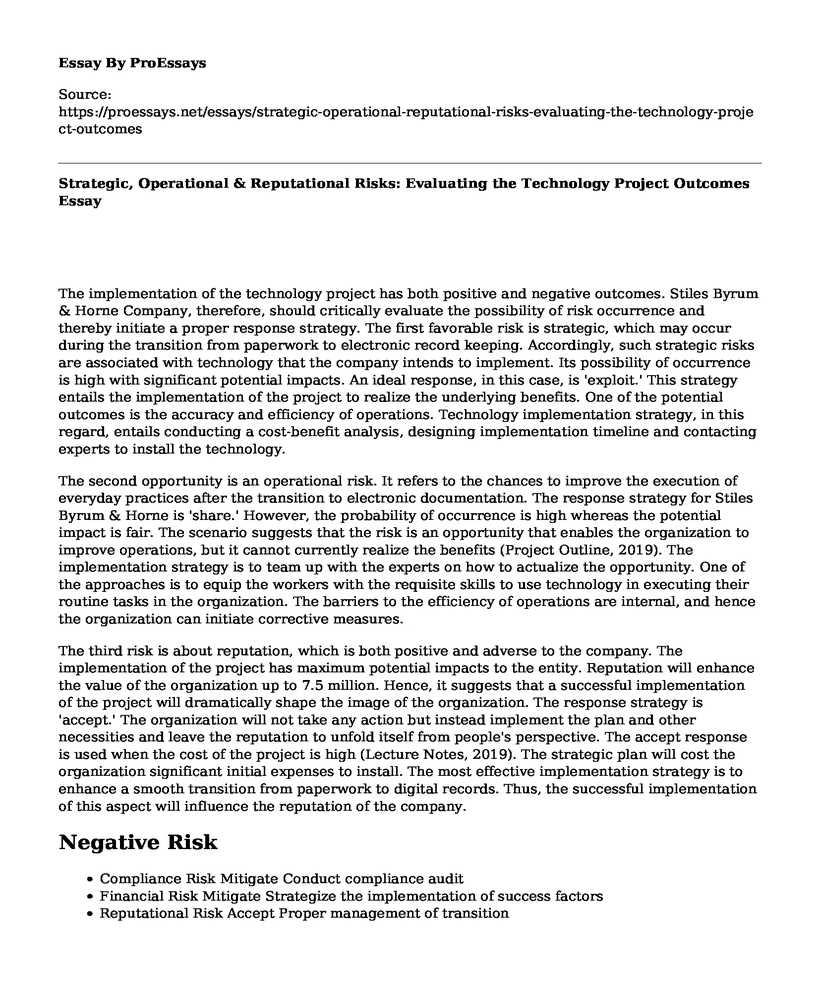The implementation of the technology project has both positive and negative outcomes. Stiles Byrum & Horne Company, therefore, should critically evaluate the possibility of risk occurrence and thereby initiate a proper response strategy. The first favorable risk is strategic, which may occur during the transition from paperwork to electronic record keeping. Accordingly, such strategic risks are associated with technology that the company intends to implement. Its possibility of occurrence is high with significant potential impacts. An ideal response, in this case, is 'exploit.' This strategy entails the implementation of the project to realize the underlying benefits. One of the potential outcomes is the accuracy and efficiency of operations. Technology implementation strategy, in this regard, entails conducting a cost-benefit analysis, designing implementation timeline and contacting experts to install the technology.
The second opportunity is an operational risk. It refers to the chances to improve the execution of everyday practices after the transition to electronic documentation. The response strategy for Stiles Byrum & Horne is 'share.' However, the probability of occurrence is high whereas the potential impact is fair. The scenario suggests that the risk is an opportunity that enables the organization to improve operations, but it cannot currently realize the benefits (Project Outline, 2019). The implementation strategy is to team up with the experts on how to actualize the opportunity. One of the approaches is to equip the workers with the requisite skills to use technology in executing their routine tasks in the organization. The barriers to the efficiency of operations are internal, and hence the organization can initiate corrective measures.
The third risk is about reputation, which is both positive and adverse to the company. The implementation of the project has maximum potential impacts to the entity. Reputation will enhance the value of the organization up to 7.5 million. Hence, it suggests that a successful implementation of the project will dramatically shape the image of the organization. The response strategy is 'accept.' The organization will not take any action but instead implement the plan and other necessities and leave the reputation to unfold itself from people's perspective. The accept response is used when the cost of the project is high (Lecture Notes, 2019). The strategic plan will cost the organization significant initial expenses to install. The most effective implementation strategy is to enhance a smooth transition from paperwork to digital records. Thus, the successful implementation of this aspect will influence the reputation of the company.
Negative Risk
- Compliance Risk Mitigate Conduct compliance audit
- Financial Risk Mitigate Strategize the implementation of success factors
- Reputational Risk Accept Proper management of transition
Compliance risks have adverse effects on the company if it occurs. While it has a low possibility of occurrence, its effects have far-reaching impacts since it has significant potential outcomes. Its response strategy is to mitigate. The approach entails implementing measures that will enable the organization to minimize the probability of risk occurrence. Also, it involves procedures that will reduce the impacts of the event if it occurs. The implementation mechanism is identifying the laws, regulations and strategizing on their compliance. The managers will conduct an audit before using the technology to ascertain whether all the requirements have been met. This move will reduce the risk possibility and its effects on the organization if it occurs.
Financial risk is adverse and has high chances of occurrence. It has severe potential consequences to the entity if it occurs. The financial implications may involve a loss of profits besides significant initial cash outlay. Mitigation is a valid response strategy. It entails lessening the impact of risk, which in this case causes financial loss. The firm's implementation plan is to strategize on factors that improve the success rate of the project as an approach to prevent financial loss because of failures or the project's inability to achieve its goals.
References
Lecture Notes (2019). Plan Risk Response: Project Management plan and Strategies for Threat.
Project Outline - Unit 1. (2019). Template for Overall Risk Management Strategy and Risk Categories.
Cite this page
Strategic, Operational & Reputational Risks: Evaluating the Technology Project Outcomes. (2022, Dec 29). Retrieved from https://proessays.net/essays/strategic-operational-reputational-risks-evaluating-the-technology-project-outcomes
If you are the original author of this essay and no longer wish to have it published on the ProEssays website, please click below to request its removal:
- Essay Example on Management of Hospitals
- Business Model Generation and Strategic Management Concepts Paper Example
- Paper Example on Exploring Subway's Value Chain: SWOT Analysis
- Essay on IKEA's Sustainability Strategy: How Well Is It Doing?
- Essay Example on Product & Process Innovation: The Essential Link to Industry Life Cycle
- Free WIFI: A Benefit to Society - Report Sample
- Essay Sample on Employability: The Key to Organizations' Success in a Competitive Landscape







